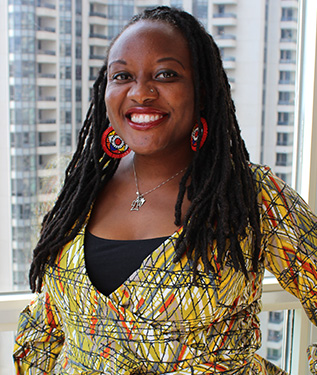
York University Assistant Professor Molade Osibodu is the lead author on a paper titled “A Participatory Turn in Mathematics Education Research: Possibilities,” a paper published in the prestigious Journal for Research in Mathematics Education, which calls for greater participation in research involving minoritized communities.

The journal is considered the foremost publication on mathematics education research, making Osibodu’s achievement a notable one with the promise of significant impact. “I feel really grateful to have the paper in this journal and have the ideas that we talked about be discussed with a wide group of readers,” says Osibodu.
The theoretical paper argues mathematics education research rooted in minoritized communities often risk excluding or only superficially accounting for their perspectives and experiences. Furthermore, it is often led by those with dominant social identities (white, male, well-funded) who attempt to comment on realities of inequity as objective observers when they may not be.
Complicating the power dynamic tension between researchers and studied communities is how mathematics education positions minoritized students and families as outcomes of politically motivated reform, which has the potential to cause harmful or dehumanizing mathematical experiences.
“Humans are a part of this work and so you have to include their voices and particularly for those of us who claim to want to do work that is equity focused, that is socially just then we have to recognize that it is paramount to center the voices of those whose experiences we seek to better,” says Osibodu.
“If we really want to have meaningful change in mathematics education, we can't keep doing research the same way. If the goal is to engender positive social change, then we have to also recognize the community members have a lot of knowledge to bring in – especially if you are not part of that community.”
The paper offers several recommendations towards a more participatory research paradigm, which integrates those for whom mathematics education research is most consequential:
- historically marginalized communities should be co-researchers;
- disparate forms of knowing should be re brought into continuous contact with emphasis on conversation around where marginzalition is most felt;
- people, institutions and practices need to be acknowledged as historicized;
- tensions should be embraced as spaces for learning with outside researchers understanding that their participation may unintentionally colonize the research process; and
- practices should be renegotiated toward making social change that outlasts the research project or promote structural changes that shift resources in more equitable ways.
“In however many years of math education research has been going on, youth of colour, and other marginalized groups are still struggling in their experiences,” says Osibodu. What’s called for here is a sentiment she credits to academic Katherine McKittrick, and her book Dear Science and Other Stories. “If you want to get new, different answers, you have to ask different questions. That includes the types of methodologies that you are embracing. You have to try different things,” she says.
The approaches outlined in Osibodu’s paper highlights a promising route. “I hope that more math education researchers consider doing work this way.”
